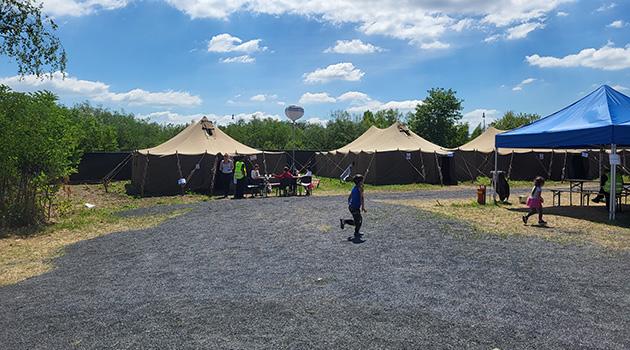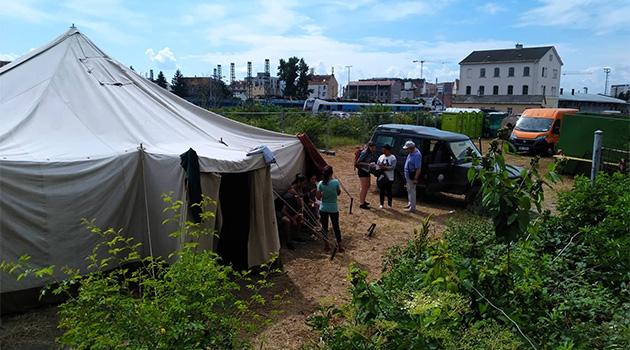Czech capital to close one camp for refugees from Ukraine, numbers of refugees reportedly declining

Tomorrow the City of Prague will close its refugee camp in the Malešice neighborhood of Prague that has been chiefly used by Romani refugees from Ukraine. The main reasons for the closure are, according to the city, the fact that the current situation is being dealt with and the number of refugees is falling.
As of tomorrow evening, just the refugee camp in the Troja quarter will be in operation. According to Martin Šimáček, director of the Center for Social Services Prague (CSSP), which is taking care of the Malešice operation, the decision is logical because it is not efficient to run two camps when the number of refugees is declining so significantly.
Numbers of refugees from Ukraine living in the camps are falling
The numbers of refugees from Ukraine in both camps, according to Vít Hofman, spokesperson for the City of Prague, have significantly fallen in recent weeks; today is the last day refugees will be sleeping in Malešice, after which they will be moved to Troja. Mayor of Prague Zdeněk Hřib (Pirate Party) said the city had perceived the refugee camps from the beginning as an extreme, temporary solution.
From the time that Malešice began operations until today, about 1,200 refugees, mostly children and women, have found support there; the camp was intended for refugees from Ukraine who had lost their housing in the Czech Republic somehow or who are not entitled to any temporary protection for various reasons. As of today there were 71 refugees in the Malešice refugee camp.
“We decided to suspend operations because [Malešice] is already operating with the minimum number of people. We are planning to retrofit the site with a different type of tent so we can reopen in case of need,” said another spokesperson for city hall, Filip Poňuchálek.
“We are quite glad the CSSP and its partners – the Organization for Aid to Refugees (OPU), Naděje (Hope), Iniciativa Hlavák (main railway station initiative) – have this opportunity to run the camp. Certainly it’s an emergency solution,” news server Romea.cz was informed by Šimáček.
“Those who were accommodated in Refugee Facilities Administration units and lost that accommodation should be given the option of temporary housing elsewhere. However, for various reasons, such housing is not available – at the level of the state administration enough capacities were not secured to accommodate especially the big families, including Romani ones, who lost their initial accommodation,” the CSSP director explained.
“They ended up as de facto homeless people, including very young children, nursing infants and toddlers,” Šimáček said. He recalled that it is generally known that these refugees were then abandoned in absolutely substandard conditions at the main railway station, despite all the efforts expended on their behalf by nonprofit organizations, the Railway Administration, and firefighters.
“For that reason, we strove to open a camp and I am glad we achieved that,” Šimáček said. “In addition to the camp, we are also running standard temporary accommodation and accompanying Romani refugees through the procedure of requesting temporary protection.”
Šimáček: Refugees from Ukraine arrive quite frequently in an unsatisfactory state of health
The average length of stay by the refugee women with their children from Ukraine in Malešice is, according to the CSSP director, about three or four days. “They are quite frequently in bad shape when they arrive,” he told Romea.cz.
“They have been migrating around the Czech Republic or between Central European countries. Often they are so fatigued as to be on the brink of exhaustion, the children are usually sick,” the CSSP director said.
“We provide them accommodation, food, and psychosocial aid. We discuss with them what they will do next,” Šimáček told Romea.cz.
“There are professional social workers available there for them. We know some of them are under pressure – they are being blackmailed by organized groups to travel to the Czech Republic with their children to request humanitarian aid benefits in money that is then taken away from them,” he described.
“That makes our aid all the more important. We approach this as social workers doing our best to assist our clients in a situation that is unsatisfactory,” the CSSP director said.
Šimáček expressed his satisfaction with the fact that gradually, a few refugees from Ukraine have demonstrated the will to remain in the Czech Republic, have managed to settle, do want to integrate here, and are sending their children to school. “Our facility in Záběhlice is also serving them,” he said.
“We see that, in collaboration with social workers, the refugees gradually stabilize, the children participate in recreational and educational programs, their health improves. We want to support the target group of impoverished refugees from Ukraine in the long term, we are arranging more capacities for this,” he told Romea.cz.
Prague’s first refugee camp, mostly for Romani refugees from Ukraine, was opened by city hall in the Troja quarter with a capacity of 150 beds on Saturday, 14 May, and during that first weekend, 142 refugees found shelter there. At the close of May and start of June another location with the same capacity began operating in Malešice.
